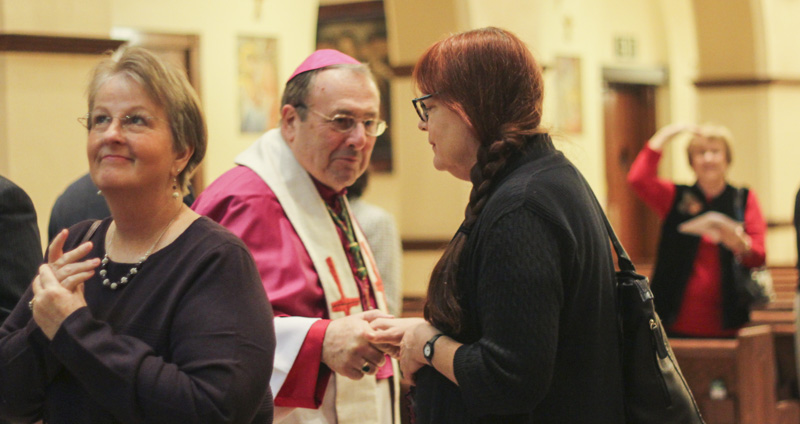
COLUMBIA—Bishop Herman Yoos of the South Carolina Synod of the Evangelical Lutheran Church in America told the crowd that during times of national division, Christians have no choice but to reconcile with each other, overcome differences and join together to proclaim Christ’s message.
“If ever there was time when we need to be compelled toward reconciliation, it is now, considering how polarized we are at the moment,” Bishop Yoos said in a stirring homily at the 21st Fellowship of South Carolina Bishops’ prayer service, held Jan. 19 at St. Joseph Church in Columbia. The annual service came on the night before Inauguration Day.
Bishop Robert E. Guglielmone welcomed the crowd of about 100 and led the ceremony. Bishop Andrew Waldo of the Episcopal Diocese of Upper South Carolina also attended, while Bishop L. Jonathan Holston of the South Carolina Conference of the United Methodist Church, and Bishop Gladstone B. “Skip” Adams III of the Episcopal Church in South Carolina sent representatives.

Bishop Yoos condemned the biases that have emerged during one of the most contentious election years in history, and spoke about the dangers of a practice he called “othering,” the tendency to see people who are different in any way from ourselves in an unfavorable light.
“Once we view someone as the other we are no longer motivated to understand them,” he said.
He said Christians need to realize they too have been guilty of separating themselves from each other, splitting off according to denomination, liturgy style, or doctrine. Bishop Yoos said racial separation among believers is still a huge problem, reminding the people that, too often, the worship hour in South Carolina and elsewhere is still one of the most segregated hours of the week.
“We have spent too much time focusing on ‘otherism’ when we as Christians are all in the same boat, confessing our sins and our need for the reconciling love of Jesus Christ,” he said. “Reconciliation is what our world so desperately needs to see and receive right now.”
Yoos said unity among Christians is also needed because of the growing trend toward unbelief in American society. Christians cannot afford to retreat into “ghettos of belief” at a time when secularism is on the rise.
Bishop Yoos also briefly explained the ecumenical group’s recent name change, from the Lutheran, Anglican, Roman Catholic, United Methodist fellowship (LARCUM) to the Fellowship of Carolina Bishops. The change was made in late 2016 to reflect an outreach to create more racial diversity in the group by including bishops from African Methodist Episcopal (AME), AME Zion, and other denominations with bishops as leaders.
Top photo, Miscellany/Christina Lee Knauss: Bishop Robert E. Guglielmone greets participants at the ecumenical prayer service.

